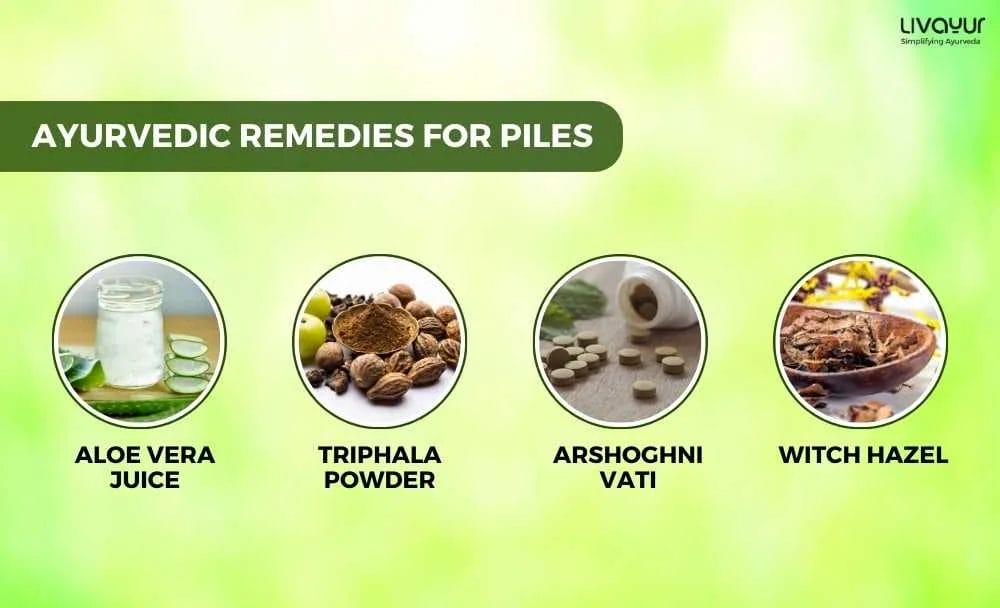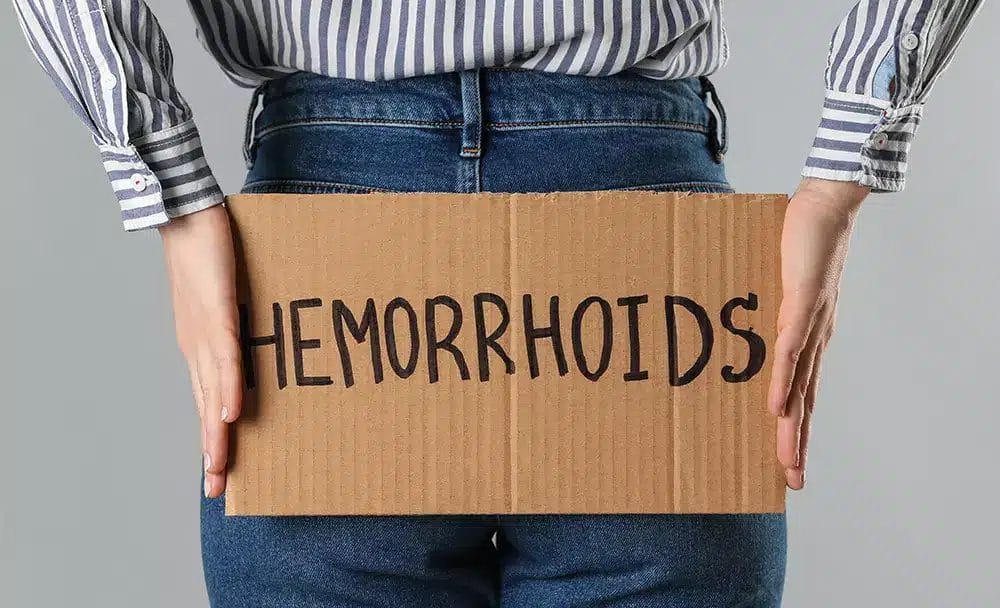This article is reviewed by Dr. Vipin
सर्वमन्य परित्यज्य शरीरमनुपालयेत्। शरीरस्य प्राणस्तस्य सर्वमेव विनश्यति।।
One should care for the health of his body with the utmost priority. Because if a healthy body is lost, everything else also is lost.
Piles, also known as haemorrhoids, are swollen blood vessels that develop in the anal canal or rectum. They can cause discomfort, pain, and itching, affecting both men and women. Piles can be classified into two types: internal and external. Internal piles occur inside the rectum, while external piles develop around the anus. Understanding the causes, symptoms, treatment options, prevention strategies, and home remedies for piles is essential for managing this condition effectively [1] [2] [3].
Haemorrhoids, also called piles, happen when clusters of veins in your rectum or anus get swollen (or dilated). When these veins swell, blood pools inside and causes the veins to expand outward into the membranes around your rectal and anal tissue. This can become uncomfortable or painful.
Types of Piles
- Internal: These can’t always be seen because they’re too deep in your anus to be visible. They are protrusions of the wall of your anal canal or rectum. Less serious internal haemorrhoids are bumps inside, and more serious ones can form a long protrusion.
- Prolapsed: This is the type where the internal haemorrhoid swells and elongates to the point where it protrudes out of your anus. Less serious prolapsed haemorrhoids come out of the anus during straining but spontaneously retract when you relax, whereas more serious prolapsed haemorrhoids remain protruding from the anus.
- External: Appear as one or more bumps on and around the anus.
- Thrombosed: These are external or internal haemorrhoids in which the blood that’s pooled inside has clotted, which can be painful in external haemorrhoids.
Causes of Piles
Piles can be caused by various factors such as:
- Chronic constipation
- A sedentary lifestyle
- Lack of physical activity
- Obesity
- Hormonal changes during pregnancy
- A low-fibre diet
- Inadequate fluid intake
- Prolonged sitting or standing
- Family history of piles
Symptoms of Piles
The symptoms of piles can vary depending on the type and severity of the condition. Common symptoms include:
- Pain
- Itching
- Swelling and discomfort
- Bleeding during bowel movements.
- Painful lump around the anus.
- Mucus discharge
- Incomplete bowel evacuation.
Symptoms can range from mild to severe, and it is important to seek medical attention for proper diagnosis and treatment.
Treatment for Piles
There are various treatment options available for managing piles. In mild cases, home remedies and self-care measures can provide relief. Increasing dietary fibre is essential to soften the stool and ease bowel movements. Consuming fruits, vegetables, whole grains, and legumes can help achieve this. Staying hydrated by drinking an adequate amount of water is also important to prevent constipation. Over-the-counter creams, ointments, and suppositories may help alleviate symptoms such as itching and pain. Taking warm sitz baths, where the affected area is soaked in warm water, can provide relief from discomfort. In more severe cases, medical procedures such as rubber band ligation, sclerotherapy, infrared coagulation, or surgery may be necessary to remove or shrink the piles [2].
Measures You Should Take To Prevent Piles
- Adopt healthy lifestyle changes.
- Include an adequate amount of fiber in the diet
- Regular physical activity and exercise
- Avoid prolonged sitting or standing
- Take short breaks to move around
- Avoid straining during bowel movements
- Maintain proper hygiene by keeping the anal area clean and dry.
Home Remedies for Piles
Several home remedies can provide relief from piles symptoms like:
- Sitz baths, where the affected area is soaked in warm water, can help reduce pain and inflammation.
- Adding Epsom salt or baking soda to the bathwater may enhance a soothing effect.
- Applying cold compresses or ice packs to the anal area can alleviate swelling and discomfort.
- Consuming aloe vera juice, which has anti-inflammatory properties, may help promote bowel regularity and reduce inflammation.
- Triphala powder, a traditional Ayurvedic remedy, can be mixed with warm water and consumed to ease constipation and promote smooth bowel movements.
These home remedies can provide temporary relief, but it is important to consult a healthcare professional for a proper diagnosis and comprehensive treatment plan. [4].
Ayurvedic Treatment for Piles
Ayurveda, the traditional Indian system of medicine, offers natural remedies for managing piles. Herbal preparations, such as Triphala Churna, and Arshoghni Vati, are commonly used in Ayurvedic treatment. These remedies aim to improve digestion, relieve constipation, reduce inflammation, and strengthen blood vessels. However, it is advisable to consult an Ayurvedic practitioner for personalised guidance and appropriate dosage [4].
Food to Avoid in Piles
Certain foods can exacerbate piles symptoms and should be avoided. Spicy foods, caffeine, and alcohol can irritate the digestive system and worsen haemorrhoids. Processed foods that are low in fibre can contribute to constipation and make bowel movements more difficult. It is advisable to limit the consumption of these foods and opt for a diet rich in fibre, including fruits, vegetables, whole grains, and legumes. Drinking an adequate amount of water is also important to maintain hydration and soften the stool [5].
Conclusion
In conclusion, piles are a common condition that can cause discomfort and affect daily life. Understanding the causes, symptoms, treatment options, prevention strategies, and home remedies is crucial for managing this condition effectively. Lifestyle modifications, home remedies, and medical interventions can provide relief and promote healing. It is essential to seek medical advice for proper diagnosis and personalised treatment. By adopting a healthy lifestyle, including a high-fibre diet, regular exercise, and practising good hygiene, individuals can prevent the occurrence or recurrence of piles and maintain optimal digestive health.
Disclaimer: This article is written from a health and lifestyle perspective. It is for general information and not meant to substitute any medical advice. Please consult your doctor for appropriate medical consultation.
FAQs
What causes piles?
Haemorrhoids can develop from increased pressure in the lower rectum due to straining during bowel movements, sitting for long periods, especially on the toilet or having chronic diarrhea or constipation.
Is piles surgery painful?
A majority of patients do not experience any pain during Laser Piles Surgery. During surgery, anaesthesia eventually wears off which results in patients feeling pain. However, pain is significantly less in laser surgery. Seek consultation from qualified and experienced doctors.
How long do piles last?
Haemorrhoids (piles) often clear up by themselves after a few days. However, many treatments can reduce itching and discomfort. Making simple dietary changes and not straining on the toilet are often recommended first.
References:
- https://www.mayoclinic.org/diseases-conditions/hemorrhoids/symptoms-causes/syc-20360268
- https://my.clevelandclinic.org/health/diseases/15120-hemorrhoids#symptoms-and-causes
- https://www.medicalnewstoday.com/articles/239454#causes
- https://drvaidyas.com/blogs/piles/home-remedies-for-hemorrhoids
- https://www.healthline.com/nutrition/food-for-piles#Foods-to-avoid
- https://www.healthline.com/health/types-of-hemorrhoids#what-do-they-look-like
- https://www.mayoclinic.org/diseases-conditions/hemorrhoids/symptoms-causes/syc-20360268#:~:text=Hemorrhoids%20can%20develop%20from%20increased,Having%20chronic%20diarrhea%20or%20constipation.
- https://patient.info/digestive-health/rectal-bleeding-blood-in-faeces/piles-haemorrhoids
- https://medicahospitals.in/blog/worried-about-piles-heres-everything-you-need-to-know/#:~:text=A%20majority%20of%20patients%20do,from%20qualified%20and%20experienced%20doctors.
- https://www.nhsinform.scot/illnesses-and-conditions/stomach-liver-and-gastrointestinal-tract/haemorrhoids-piles/#:~:text=Haemorrhoids%20(piles)%20often%20clear


















